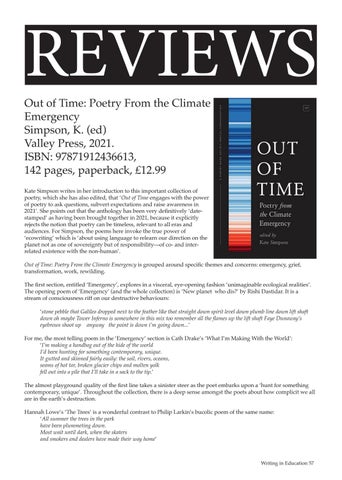REVIEWS
Out of Time: Poetry From the Climate Emergency Simpson, K. (ed) Valley Press, 2021. ISBN: 97871912436613, 142 pages, paperback, £12.99 Kate Simpson writes in her introduction to this important collection of poetry, which she has also edited, that ‘Out of Time engages with the power of poetry to ask questions, subvert expectations and raise awareness in 2021’. She points out that the anthology has been very definitively ‘datestamped’ as having been brought together in 2021, because it explicitly rejects the notion that poetry can be timeless, relevant to all eras and audiences. For Simpson, the poems here invoke the true power of ‘ecowriting’ which is ‘about using language to relearn our direction on the planet not as one of sovereignty but of responsibility—of co- and interrelated existence with the non-human’.
Out of Time: Poetry From the Climate Emergency is grouped around specific themes and concerns: emergency, grief, transformation, work, rewilding. The first section, entitled ‘Emergency’, explores in a visceral, eye-opening fashion ‘unimaginable ecological realities’. The opening poem of ‘Emergency’ (and the whole collection) is ‘New planet who dis?’ by Rishi Dastidar. It is a stream of consciousness riff on our destructive behaviours: ‘stone pebble that Galileo dropped next to the feather like that straight down spirit level down plumb line down lift shaft down oh maybe Tower Inferno is somewhere in this mix too remember all the flames up the lift shaft Faye Dunaway’s eyebrows shoot up anyway the point is down i’m going down...’ For me, the most telling poem in the ‘Emergency’ section is Cath Drake’s ‘What I’m Making With the World’: ‘I’m making a handbag out of the hide of the world I’d been hunting for something contemporary, unique. It gutted and skinned fairly easily: the soil, rivers, oceans, seams of hot tar, broken glacier chips and molten yolk fell out into a pile that I’ll take in a sack to the tip.’ The almost playground quality of the first line takes a sinister steer as the poet embarks upon a ‘hunt for something contemporary, unique’. Throughout the collection, there is a deep sense amongst the poets about how complicit we all are in the earth’s destruction. Hannah Lowe’s ‘The Trees’ is a wonderful contrast to Philip Larkin’s bucolic poem of the same name: ‘All summer the trees in the park have been plummeting down. Most wait until dark, when the skaters and smokers and dealers have made their way home’
Writing in Education 57






